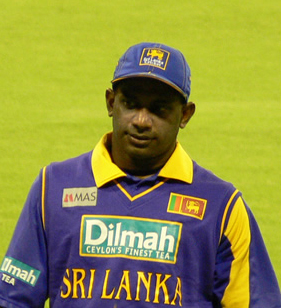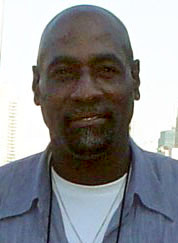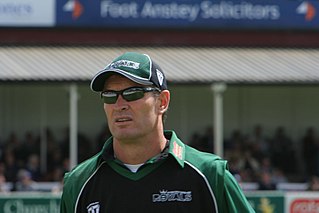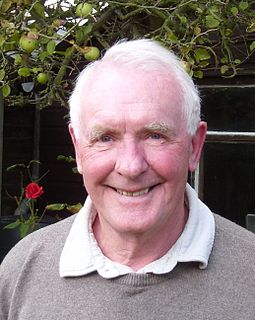
Ian Terence Botham, Baron Botham, is an English cricket commentator, member of the House of Lords, a former cricketer who has been chairman of Durham County Cricket Club since 2017 and charity fundraiser.

Deshabandu Sanath Teran Jayasuriya, is a former Sri Lankan cricketer and a captain. He is credited for having revolutionized one-day international cricket with his explosive batting with Romesh Kaluwitharana in the mid-1990s, which initiated the hard-hitting modern-day batting strategy of all nations.

Sir Isaac Vivian Alexander Richards is an Antiguan retired cricketer who represented the West Indies cricket team between 1974 and 1991. Batting generally at number three in a dominant West Indies side, Richards is widely regarded as one of the greatest batsmen of all time.

Deshabandu Ranjan Senerath Madugalle is a former Sri Lankan cricketer who currently serves as the Chief of the panel of ICC match referees. He was educated at Trinity College, Kandy, and Royal College, Colombo.

Graeme Ashley Hick is a Zimbabwean-born former England cricketer who played 65 Test matches and 120 One Day Internationals for England. He was born in Rhodesia, and as a young man played international cricket for Zimbabwe. He played English county cricket for Worcestershire for his entire English domestic career, a period of well over twenty years, and in 2008 surpassed Graham Gooch's record for the most matches in all forms of the game combined.
The tour by the Australian cricket team in England in 1981 included the 51st Ashes series of Test matches between Australia and England. Despite having been 1–0 down after two Tests, England won the next three to finish 3–1 victors, thus retaining the Ashes.
Roy Luke Dias is a former Sri Lankan cricketer who played Tests and ODIs for Sri Lanka.
Bandula Warnapura was a Sri Lankan cricketer and former captain of the Sri Lankan cricket team. He played four Test matches and twelve One Day Internationals (ODI) during his international cricketing career from 1975 to 1982. He was a right-handed opening batsman and a right-handed medium pace bowler.
Sidath Wettimuny is a former Sri Lankan cricketer, who played Test cricket and One Day Internationals as an opening batsman from 1982 to 1987. Wettimuny was a typical opening batsman in that he often played very defensively, grafting for his runs, and his ODI strike rate of 48 shows this quite clearly.
Sri Lanka toured England for cricket matches during the 2006 international cricket season. England were back home for the first time since September and looked to maintain their Test standards, which saw them keep their second place in the ICC Test Championship in India, and the teams were also competing for sixth place in the ICC ODI Championship as both England and Sri Lanka were coming off the back of two lost ODI tours on the Asian sub-continent, against India and Pakistan respectively. To add to problems, both teams were likely to be missing some key members of the team as England were without some of their squad for their previous tour and, two days before Sri Lanka departed for England, it was revealed that skipper Marvan Atapattu would stay at home for the tour due to back problems that had forced him to skip his previous tour too. Jehan Mubarak was brought in as his replacement.

Steven Thomas Finn is an English cricketer. He is a right-arm fast bowler, who also bats right-handed. At the age of 16, he became Middlesex County Cricket Club's youngest-ever debutant in first-class cricket. He made his England Test debut in 2010 against Bangladesh. He lives in Brighton. In 2019 he became a commentator for Test Match Special.
The Indian cricket team toured Sri Lanka in August 1997, participating in two Test matches and three One Day International (ODI) matches. During the first Test match, Sri Lanka scored 952 runs for 6 wickets, the highest team total in Test cricket. Several more records were established in this match, including the highest partnership for the second wicket by Sanath Jayasuriya and Roshan Mahanama. The Test series ended without a result, with both Test matches drawn.
The West Indian cricket team in England in 1991 played three one day internationals and five Tests, under the captaincy of Viv Richards, as part of an extensive tour in which they also played first-class matches against 11 first-class county teams, the combined Minor Counties, the Combined Universities of Oxford and Cambridge, and a World XI to finish, plus 55-over one-day matches against one more first-class county (Gloucestershire) and the Duchess of Norfolk's Invitation XI. Of the non-international matches, West Indies defeated Kent, Middlesex and Leicestershire in the longer matches, and Gloucestershire over 55 overs, and lost only the opening match against the Duchess of Norfolk's XI: all the other matches were drawn, although some were close to a finish. England, by contrast with the previous disastrous tour of 1988, were a far more settled side, and gave a far better account of themselves under the captaincy of Graham Gooch.

In 1984 the West Indies cricket team toured England, playing three One Day Internationals and five Tests. West Indies beat England 2–1 in the ODI series, then whitewashed England 5–0 in the Test series, and as of 2021 remain the only touring side ever to have achieved this feat. The West Indies team was captained by Clive Lloyd throughout, and England by David Gower.
The Pakistani cricket team toured England in the 1992 English cricket season, the first tour since the acrimonious visit by England to Pakistan in 1987/88, which was highlighted by the Mike Gatting/Shakoor Rana dispute. Five Test matches and five One Day Internationals were scheduled, running from May to August.
The West Indian cricket team toured England in 1980, spending virtually the whole of the 1980 English cricket season in England. West Indies also played two matches in Ireland and two in Scotland.
The England cricket team toured Sri Lanka from 28 September to 22 December 2007. England made two trips to Sri Lanka in this tour with the ODI team arriving on 25 September before returning to England on 15 October. The Test team arrived on 15 November and stayed there for the remainder of the tour. The tour included three Test matches and five ODIs.

Deshabandu Pinnaduwage Aravinda de Silva is a former Sri Lankan cricketer and captain, who has also played in English county cricket. De Silva helped Sri Lanka to win the 1996 Cricket World Cup and brought Sri Lanka from underdog status to present-day form. He has held various posts in Sri Lanka Cricket after his retirement in 2003.
In the 1982–83 cricket season, the Sri Lankan national cricket team toured to India to play the Indian national cricket team. The tour included one Test match. That match was drawn. Three players scored centuries; Duleep Mendis scored 105 in both Sri Lankan innings, and Sunil Gavaskar and Sandeep Patil scored 155 and 144 respectively, both in India's first innings. Three players took a five-wicket haul in the game; Dilip Doshi took five wickets for 85 runs in Sri Lanka's first innings, Kapil Dev took five wickets for 110 runs and Ashantha de Mel took five wickets for 68 runs.

The England cricket team have appeared in every edition of the Cricket World Cup to date, being crowned champions in 2019. In addition, they were losing finalists in 1979, 1987 and 1992. England have been eliminated from the tournament in the group stage on four occasions.








